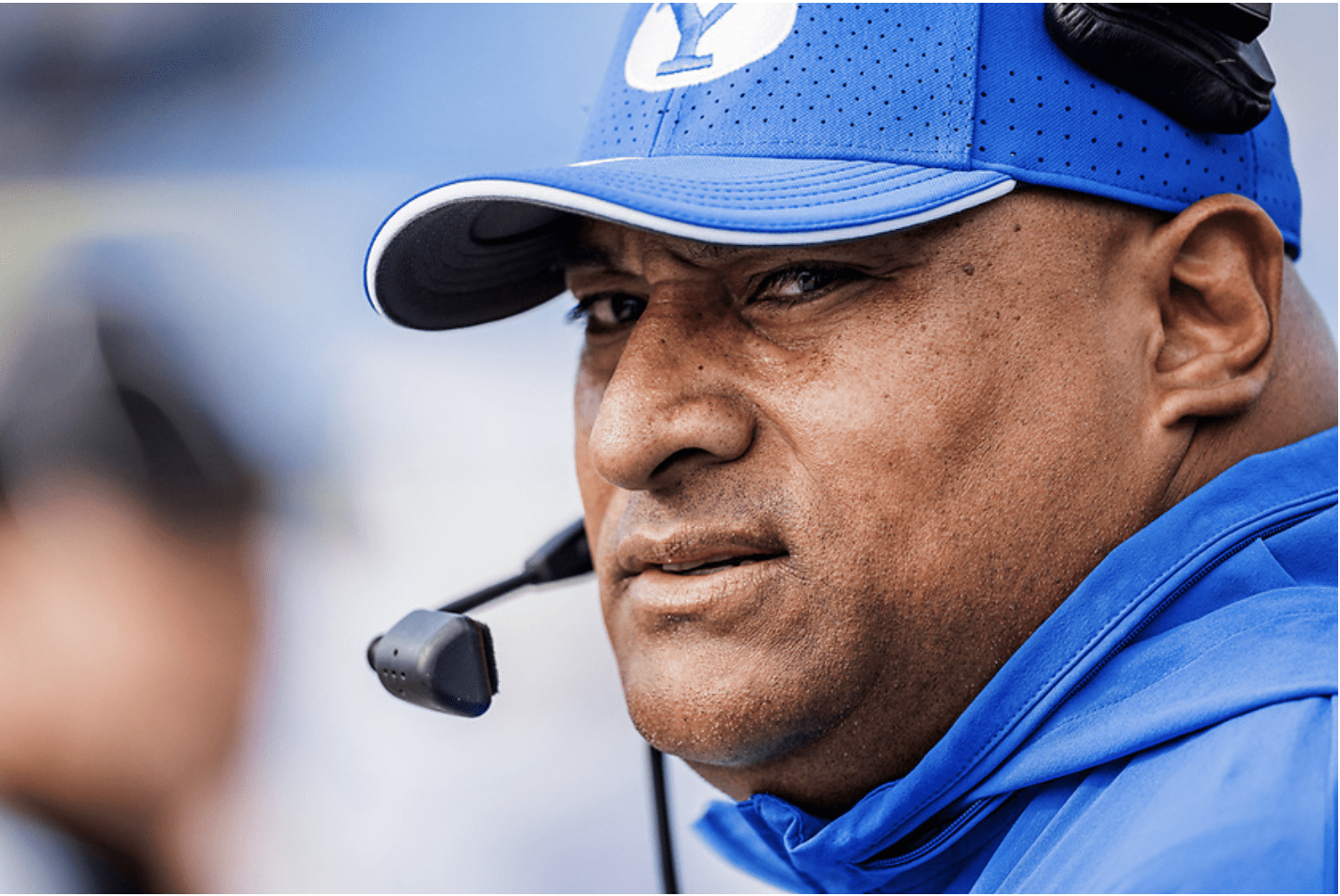
If you’re going to truly believe you’re a top football program that can compete with the big boys, then it’s high-time you start acting the part.
That was the message conveyed by Moose Bingham during a segment of Cougar Sports with Ben Criddle on Tuesday. Bingham is a former kicker for BYU, but more importantly worked as BYU’s on-campus recruiting coordinator for several years before moving on to become President of Prep Warroom, a recruiting resource several coaches depend on heavily in procuring top athletes.
While Bingham speaks positively regarding BYU’s upcoming 2024 signing class, along with other aspects, he touched on the Cougars losing yet another in-state recruiting battle to the University of Utah — specifically American Fork defensive back Davis Andrews. Andrews recently committed to sign with the Utes over offers from BYU, UCLA and Notre Dame earlier in the week.
Since Andrews’ commitment, several fans have expressed renewed frustration on how Utah continues to clean up with signing the top local talent while the Cougars continue to lag behind. Take last year as a stark example when Utah signed four of the top six in-state prospects, according to the 24/7 Sports Network, while BYU signed both the No. 5 prospect (Poka Haunga) and the No. 9 (Siale Esera.)
Many have weighed in on the primary reasons why BYU continues to lag behind Utah in recruiting battles — providing explanations ranging from academics to the overall football product to even the age-old Honor Code excuse. As for the real reasons, there’s few who can speak more authoritatively regarding the topic than Bingham, who not only has background being on the ground floor of BYU’s recruiting efforts, but continues to keep heavy tabs on every local in-state prospect.
“BYU hasn’t invested in its recruiting staff,” Bingham said when asked to explain the primary reasons why BYU continues to lag behind the Utes on the recruiting front. “It’s embarrassing and it’s awful to watch. I’m embarrassed that we haven’t put money where our mouth is…If recruiting really is our number one thing, then get recruiters in there. Justin Anderson can only do so much.”
Justin Anderson is BYU’s current recruiting coordinator and is someone Bingham speaks highly of, along with the rest of his staff that consists of former BYU players Brandon Bradley and Vince Feula. The big problem, again according to Bingham, isn’t the efforts of these three individuals, it’s the fact that the recruit coordinating responsibilities are falling on just three individuals.
“It cannot be done with three people,” Bingham said. “These aren’t the days of LaVell Edwards anymore. You have to have a real recruiting staff, you have to put money into it, and if you don’t you will be in (the same) situation year in and year out where you’re going to lose local kids.”
As for Davis specifically, Utah has been on the forefront in securing his services for some time, and while BYU made some late strides, the streamlined effort by the Utes on top continued stellar play on the field of play made them too tough to overcome.
So where does BYU specifically rank in money spent on recruiting efforts? Pretty darn low, as it were.
Total Cumulative 5 yr Athletics RECRUITING Expenses (Men's & Women's) per EADA 2017-21
FBS schools only
Teams making College Football Playoffs during the last 5 years Bolded & Italicized)
Georgia $ 20,227,870
Alabama $ 15,292,576
Texas A&M $ 14,796,944…— Jeff Fuller (@jjfuller72) August 22, 2023
Of course it’s not all about money spent while recognizing that every individual recruit varies on what primary factors lead them to their final recruiting decisions and BYU has certainly overcome its largely self-imposed obstacles with several recruits in recent memory. Bingham is the first to point out and to even celebrate the strides BYU’s staff has made on the local recruiting front while believing the program holds a great sales pitch, considering its academics, coaching staff along with a rising competitive product that is increasingly landing more players on NFL rosters.
But there needs to be more salesmen, according to Bingham — specifically more staff to make sure all gaps are properly filled in recruiting efforts.
So how big should BYU’s full-time recruiting staff be?
According to Bingham, the Cougar’s staff should be at a minimum of five full-time staff members, but probably as many as ten to truly compete with the likes of Utah and other top programs.
“We’re not even operating at a G-5 level. We’re operating at the FCS level of some of the schools in this state, honestly,” Bingham said.
As Criddle pointed out in the interview, the problem may be that BYU simply hasn’t received the revenue necessary to increase its recruiting staff yet, and when the expected $18 million windfall from Big12 affiliation makes its way to the program a bunch of new hires will be made. BYU typically doesn’t spend money it doesn’t have firmly in place and there is hope that once in place BYU will pose a recruiting staff necessary to legitimately compete for top talent year-in and year-out.
Even assuming BYU gets its act together in posing a competitive recruiting staff, winning recruiting battles versus Utah will remain a problem given the Utes’ head-start and continued efforts on the recruiting front, not to mention a very good football product that has a history of developing NFL talent. But things can change quickly, and should BYU continue to show a competitive product on the field coupled with better and more pointed efforts on the recruiting front, those wins against the Utes could be coming sooner rather than later.


